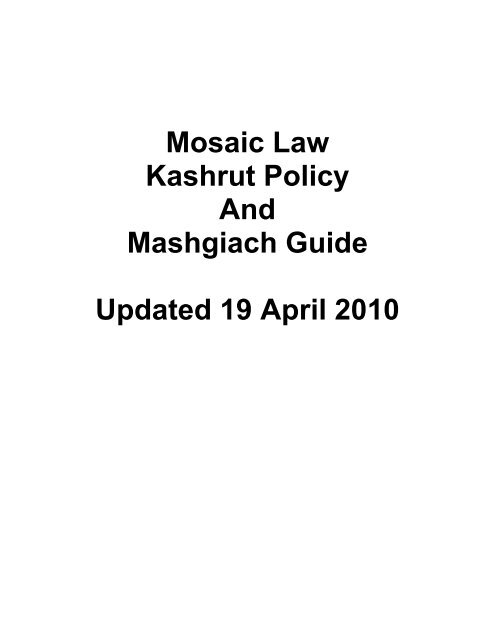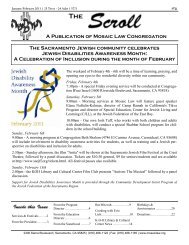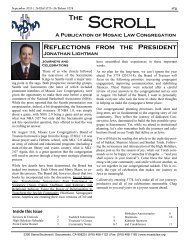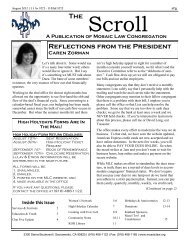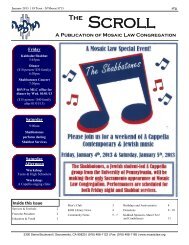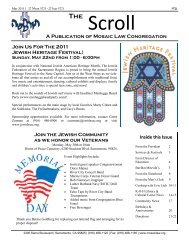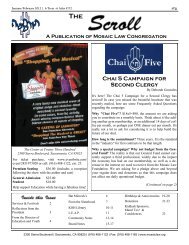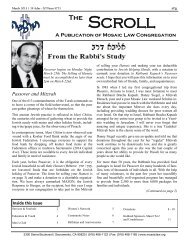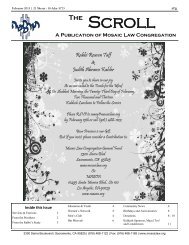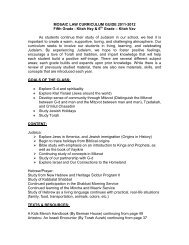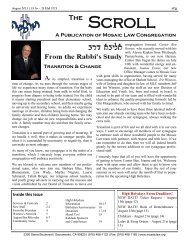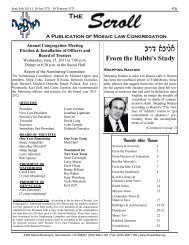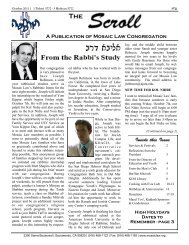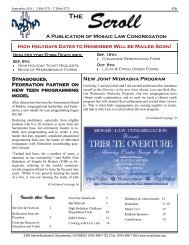Mosaic Law Kashrut Policy And Mashgiach Guide ... - My Host Control
Mosaic Law Kashrut Policy And Mashgiach Guide ... - My Host Control
Mosaic Law Kashrut Policy And Mashgiach Guide ... - My Host Control
- No tags were found...
You also want an ePaper? Increase the reach of your titles
YUMPU automatically turns print PDFs into web optimized ePapers that Google loves.
Table of Contents1 KASHRUT POLICY ......................................................................................................................... 31.1 Introduction ............................................................................................................................... 31.2 Definitions ................................................................................................................................. 41.3 Supervision ............................................................................................................................... 41.4 Product Certification .................................................................................................................. 51.5 Milk and Meat Separation ......................................................................................................... 51.6 Dairy .......................................................................................................................................... 51.7 Wine .......................................................................................................................................... 51.8 Meat and Fish ........................................................................................................................... 51.9 Shabbat and Holy Days ............................................................................................................ 62 Kitchen Rules .................................................................................................................................. 73 <strong>Mashgiach</strong> Procedures ................................................................................................................. 113.1 Overview ................................................................................................................................. 113.2 Inspect the Kitchen for Readiness To Use .............................................................................. 123.3 Inspect All Food ...................................................................................................................... 123.4 Inspect Everything Used for Preparation ................................................................................. 123.5 Ensure Preparation Meets All Requirements .......................................................................... 123.6 Ensure Presentation Meets All Requirements ......................................................................... 123.7 Ensure Cleaning Meets All Requirements ............................................................................... 123.8 Report Hours, Payment, and Injuries ...................................................................................... 134 Hechsher Symbols and Kosher Foods .......................................................................................... 14
1 KASHRUT POLICY1.1 IntroductionThese guidelines are based on the Standards for Congregational Practice of the United Synagogue ofConservative Judaism which states:“...The congregation shall require, and make every effort to ensure, that Shabbat and <strong>Kashrut</strong> areappropriately observed at all functions on the premises owned or under its control, and functionssponsored by the congregation or under its auspices on other premises. All of such functions shall beviewed as means to further the teachings and values of Judaism...”(Standards for Congregational Practice of the USCJ. Article IV, Section 1).When we come together as a Jewish community, we do so with reverence for God, respect for oneanother, and commitment to Jewish values. Keeping kosher within our synagogue is one way that weexpress our relationship with God and with each other. Following the Jewish dietary laws of <strong>Kashrut</strong>within our synagogue helps us to take the basic human need for food and transform it into anopportunity for adding holiness to our lives. As a conservative congregation, our <strong>Kashrut</strong> policy isgrounded in Halacha - Jewish law. We provide a service to our Jewish community by ensuring thatfood prepared and served in our facility conforms to the standards of <strong>Kashrut</strong>. This allows allmembers of our synagogue family, prospective members and guests to join in celebration andobservance regardless of each individual’s level of observance. While each conservativesynagogue’s <strong>Kashrut</strong> policy differs somewhat, the principal theme is the same – an effort toaccommodate all members of our community to create an environment so that any member,prospective member or guest that keeps kosher will be able to maintain those standards while eatingat the synagogue. At <strong>Mosaic</strong> <strong>Law</strong>, we are a sacred community, and as such we must be welcomingand inclusive of members and guests who do not keep kosher as well as those who do keep kosher.Various people may have different interpretations of specific aspects of <strong>Kashrut</strong> and varying levels ofobservance, but the synagogue should have one clear consistent policy. We trust that all of ourmembers and guests, whatever their personal practice may be, are willing to observe these policies,regardless of what their personal level of observance may be, so that any member of the Jewishcommunity can feel comfortable dining with us.1.2 Purpose of This ManualThis policy manual is prepared in order to facilitate food preparation in the MLC kitchen and Center at2300, articulate the guidelines regarding permissible activities when providing food on Shabbat, anddirect Mashgichim how to implement these.1.3 Request for ChangesTo request changes or additions to this <strong>Policy</strong>, send your request to the editor,Bill@Thaler<strong>And</strong>Thomas.org. He will prepare a draft with your request and submit it to the <strong>Mosaic</strong><strong>Law</strong> Rabbi.
1.4 DefinitionsCenter – Another name for Center at 2300Glatt Kosher – Glatt is Yiddish for smooth, meaning the lungs of the animal were smooth which wouldprevent it from being classified as treifa. This term only applies to meat products and not poultry.Glatt <strong>Mashgiach</strong> – A mashgiach selected by the Rabbi to supervise a Glatt Kosher meal.Hechsher – An insignia or symbol signifying that the item has been certified as being Kosher (SeeSection “Hechsher Symbols and Companies” for a list of accepted symbols.).Holy Day – Rosh Hoshanah, Yom Kippur, Sukkot, Passover, and ShavuotKosher – Hebrew word meaning correct. Rules for Kosher cover everything including food, time,place, and non-food things; e.g. Meat, Shabbat, Land, and Clothes.<strong>Mashgiach</strong>- Individual certified by the MLC Rabbi to supervise the <strong>Kashrut</strong> of all food preparation atMLC. Plural, Mashgichim.Rabbi – Unless otherwise noted, the Rabbi of <strong>Mosaic</strong> <strong>Law</strong> Congregation.Rav HaMakhshir – The ultimate authority on any kashrut question for the synagogue and its variousaffiliates and groups.Shabbat – The period from 18 minutes before sundown on Friday to the appearance of 3 stars aftersundown on Saturday. Consult a Jewish calendar or contact the MLC office.1.5 SupervisionThe Rabbi of <strong>Mosaic</strong> <strong>Law</strong> Congregation serves as the Rav HaMakhshir on any kashrut question forthe synagogue and its various affiliates and associations. He certifies all Mashgichim to supervisethe <strong>Kashrut</strong> of all food preparation at MLC. The Rabbi, or his designee, has the right and freedom tomonitor and inspect all deliveries for the kitchen, all ingredients to be used and all preparation. Thisincludes cooking, serving, removal and cleaning procedures.The Rabbi must also approve any mashgiach, including a glatt mashgiach, supervising a glatt kosheraffair at MLC. The glatt mashgiach works as an agent of the Rabbi. See the statement titled"Mashgichim Certified by The Rabbi of <strong>Mosaic</strong> <strong>Law</strong>" for the names of the Mashgichim and theDirector of MashgichimUnless directed otherwise by the Rabbi, the mashgiach shall supervise all food preparation, servingand associated cleaning activities at MLC. (See Section, “<strong>Mashgiach</strong> Procedures”). This includescheck-in of food, supplies and equipment, prepping, cooking, serving and cleaning. In case of anyerror or question regarding ingredients or equipment, nothing will be done until the mashgiach isinformed and provides instructions.
All food related activities must be performed in accordance with this policy. Food safety requirementsshall be strictly followed. The mashgiach shall ensure that food preparation processes and foodsbeing served meet all food safety requirements. (See Section “Food Safety Requirements”.)1.6 Product CertificationAll ingredients and products must bear a recognized hechsher or come from an approved company.(See Section “Hechsher Symbols and Kosher Foods”.) No item to be used in the preparation, servingor cleaning of food may enter the kitchen unless specifically approved by the mashgiach or Rabbi.This includes items such as aluminum foil, which may have an oil coating, which must be certified.When purchasing food, priority should be given to products imported from Israel.1.7 Milk and Meat SeparationAll people working in the kitchen shall maintain total separation of meat and milk during foodpreparation, cooking and presentation. No utensils or ingredients may be transferred from the roomsstoring milk utensils to the rooms storing meat utensils, or vice-versa. Each area must remain lockedwhen the other area is in use.1.8 DairyAll cheese, completely dairy, manufactured and packaged by reputable companies in the UnitedStates in which rennet is used as a curdling agent, are permitted (Teshuvah by Rabbi Isaac Klein,1974). However, it is preferable to use cheese with a certified hechsher (Rabbi Reuven Taff, 2002).Dairy products that do not use curdling agents (i.e. cream cheese, cottage cheese, sour cream,ricotta, etc.) must have a certified hechsher.Cheese that has been processed into a dry powder product (i.e. Parmesan and Romano) must havehechsher. This does not apply to fresh grated cheese.1.9 Wine <strong>And</strong> Other LiquorAll wines made in the USA and Canada may be considered kosher, regardless of whether or not theirproduction is subject to rabbinical supervision. Kosher certified wines should be encouraged,especially wines that are made in Israel.All other liquor including beer do not require a heksher unless such specific beverage is determinedto be unacceptable according to Jewish law.For events that will serve alcohol, it is required that non-alcoholic beverage options be provided aswell.1.10 Soft DrinksSoft drinks do not require a heksher unless such specific beverage is determined to be unacceptableaccording to Jewish law.
1.11 Meat and FishAll meat must be kosher and have a certified hechsher. Only kosher fish is allowed at MLC.Processed fish and fish products (i.e. canned, pouch, etc.) must have a certified hechsher.1.12 Shabbat and Holy DaysIt is the responsibility of the caterer to sell and/or serve food that is appropriate for Shabbat.A Friday evening Oneg Shabbat may not be dairy. It must be parve. (Note: This is because mostpeople have a meat meal for Shabbat dinner.)No cooking on Shabbat is permitted. The use of stoves, coffee makers, or other cooking equipmentis therefore limited. Use of the microwave oven on Shabbat or Holy Days is, in all cases, forbidden.A non-Jew may light sterno canisters for chafing dishes for their personal use prior to the arrival ofany guests , after which the chafing dishes may be used by Jews (hana’ah) to warm pre-cookedfoods on Shabbat.Foods that have been blanched or seared (pan-cooked) prior to Shabbat may be warmed on Shabbatprovided that they are already in an edible state (ke-ma’akhal ben derusai) prior to warming. Rawfoods cannot be warmed on Shabbat because it constitutes cooking.A non-Jew, in the presence of a mashgiach, may turn on ovens and stoves for their personal use,after which the oven may be used by Jews for the benefit (hana’ah) of warming pre-cooked foods foruse on Shabbat. Nevertheless, food may not be cooked on Shabbat for use after Shabbat. Foodmay be fully prepared before Shabbat, kept constant in a warmer, and served after Shabbat. AfterShabbat, ovens and stoves may be turned on by Jews or non-Jews, and cooking may commence, assoon as Shabbat is over and a mashgiach is present.The mashgiach shall also be present whenever food is served on Shabbat. The absence of amashgiach shall be considered a serious breach of this policy by the Caterer. In the event of anydispute or breach of this policy, or any other question of religious law, the decision of the Rabbi shallbe final and binding.A major Holy Day is different from Shabbat in the following respects:1. Food for the same day may be cooked in the presence of a mashgiach. However, a Jew maynot turn on or use any electrical equipment or ovens.2. A Jew may turn up, but cannot turn down the gas heat that is already on.3. If a major holy day should fall on Thursday or Friday, and food is to be prepared for thefollowing Shabbat, the mashgiach must be sure to perform the eruv tavshilin before Yom Tov.(see below)
2 Social Hall Kitchen RulesItems requiring a hechsher must have one of those designated APPROVED in the “HechsherSymbols and Kosher Foods” section’s table.<strong>Mosaic</strong> <strong>Law</strong> <strong>Kashrut</strong> <strong>Policy</strong> requires conformance to the requirements in the document “<strong>Mosaic</strong> <strong>Law</strong>Kitchen Facilities User Procedures”. The requirements for safely preparing food appear in thatdocument.1. The Rabbi of <strong>Mosaic</strong> <strong>Law</strong> Congregation serves as the Rav HaMakhshir on any kashrut questionfor the synagogue and its various affiliates and associations.2. The mashgiach shall supervise and be present during all food preparation activities. Thisincludes prepping, cooking, serving and cleaning.3. All ingredients and products must bear a recognized hechsher, including wine.4. All cheese, completely dairy, manufactured and packaged by reputablecompanies in the United States in which rennet is used as a curdling agent, arepermitted (Teshuvah by Rabbi Isaac Klein, 1974). However, it is preferable touse cheese with an approved heksher. Processed dairy products such as creamcheese, sour cream, cottage cheese, ricotta, powdered Parmesan, etc. must have a hechsher.5. All food, supplies, utensils and other equipment (including items such as aluminum foil) mustapproved by the mashgiach.6. A mashgiach shall also be present whenever food is served on Shabbat.7. The mashgiach shall remain until cleaning is complete.8. The Dairy Room must be locked whenever the Meat Room is open and vice-versas. No itemsmay be transferred between rooms.9. Place the correct plastic table clothes on the long kitchen tables before starting (i.e. blue =dairy, and red = meat)10. Use of the microwave oven on Shabbat or Holy Days is forbidden.11. Foods that have been par-cooked prior to Shabbat may be warmed on Shabbat provided thatthey are already in an edible state prior to warming.12. A non-Jew, in the presence of a mashgiach, may turn on ovens and stoves for their personaluse, after which the oven may be used by Jews.13. The middle sink on the east wall of the kitchen is for hand-washing and parve items only.14. No food items may be brought in opened. They must be closed and/or the seal must beunbroken.15. All baskets are for parve items only and must be lined with plastic wrap.16. Only non-dairy creamers are allowed.17. Coffee carafes must be washed separately in the dishwasher after running it for 1 empty cycle.
18. The dishwasher must be run empty for 1 cycle before washing begins and when alldishwashing has ended.19. Between times when the stove tops are used for meat and dairy meals, they must be rekasheredby a thorough cleaning. They must also be subjected to an open flame such as ablowtorch. This includes the griddle. Following treatment with a blowtorch, the burners must berun on the highest temperature setting for at least 1 hour.20. Between times when the ovens are used for meat and dairy meals, ovens must be re-kasheredfirst by a thorough cleaning. The oven must then be run on the highest temperature setting forat least 1 hour.21. Flowers, decorations, music equipment, etc. must be delivered to no later than one hour beforeShabbat starts on Friday or immediately following Shabbat. No deliveries of any kind can bemade on Shabbat for use either on or after Shabbat.22. Non-Jews may set up pre-delivered decorations and other items on Shabbat after 3:00 PM foruse after Shabbat provided no other activities are still in progress in the Sanctuary Building.23. All injuries requiring treatment by a physician must be reported to MLC Facilities Managerwithin 48 hours.3 <strong>Mosaic</strong> <strong>Law</strong> Center at 2300 Rules3.1 Use By MEMBERS OF MOSAIC LAW, OTHERCONGREGATIONS OR JEWISH ORGANIZATIONSShould an affiliate organization of <strong>Mosaic</strong> <strong>Law</strong> Congregation, an MLC member, another synagogue,its member or Jewish organization request the use of our Center where food will be served, all foodmust be kosher and prepared under the supervision of a <strong>Mashgiach</strong>, approved by the Rabbi of<strong>Mosaic</strong> <strong>Law</strong>.3.2 Use By Outside GroupsIt is clear that an important part of the new Center’s programming goal is to outreach to the GreaterSacramento Community, not just the Jewish community. Outside groups and organizations in thenon-Jewish community can look to our new Center as a venue for concerts, plays, lectures, seminars,and other types of events.3.2.1 FoodShould an outside organization require food services, the following policy will be adhered to:1. It should be encouraged for any and all meals to be served at our Center to non-Jewishgroups or organizations, to be prepared kosher and under the supervision of a <strong>Mashgiach</strong>.Kosher and Non-Kosher caterers/chefs are welcome to prepare any and all meals using the<strong>Mosaic</strong> <strong>Law</strong> kitchen, and supervised by a <strong>Mashgiach</strong>, adhering to the established <strong>Kashrut</strong>policies set forth by the rabbi. Ideally, it would be best if an exclusive gourmet koshercaterer were engaged by the Center to provide all requested food services.
2. If an exclusive gourmet kosher caterer is not able to be hired, then outside non-Koshercaterers would be permitted to prepare the meals using their own off-site kitchen to bestaged and served at the Center, according to the following criteria:• No synagogue dishes, utensils, serving pieces may be used for these meals unless the entire meal isprepared kosher in the <strong>Mosaic</strong> <strong>Law</strong> Kitchen under the supervision of a <strong>Mashgiach</strong>.• The meal is intended for a non-Jewish group/organization only.• It is suggested that meals be either dairy or vegetarian.• Should meat be requested, the meat must be certified kosher and must be prepared at the synagogueusing special kosher portable grills to be purchased and maintained by the synagogue. Any and allmeat preparation must be supervised by a <strong>Mashgiach</strong>.• For meat meals, no dairy products or dairy ingredients can be included in the preparation of themeal, nor served with the meal. This includes any side dishes and desserts.• For meat, dairy and vegetarian meals, no ingredients containing non-kosher animal fat, non-kosherbeef or chicken stock, non-kosher fish or other non-kosher additives can be used.• Fresh or smoked fish of a kosher species (having fins and scales) will be permitted. No Shell Fish orother non-kosher fish will be permitted. For a list of permitted fish go to the following website:http://www.kashrut.com/articles/fish/• Should a non-Jewish group/organization request that meat, fish and vegetarian meals be served forthe same event, all of the above rules apply regarding non-kosher or dairy ingredients.3.2.2 OPERATION OF THE CENTER ON SHABBAT AND JEWISH HOLIDAYSAllowing the Center to host events for the non-Jewish community is complex becausespecifically we would create a concern for public perception in which the Shabbat would bedesecrated, which according to Jewish <strong>Law</strong> is called mar'it ayin. The Shulhan Arukh (Code ofJewish <strong>Law</strong>) (OH 243:1) codifies the basic principle that when a particular place of business iswidely known to be owned by Jews, and it is not the type of business which is commonly leasedout to non-Jews to operate in exchange for a share in the profits, the fact that the "name of a Jewis upon it" makes it forbidden to have non-Jews operate the business onShabbat.Synagogues are certainly widely known to be Jewish institutions, so any event at the Center ona Shabbat or Jewish Holiday would create this perception I stated above, which would result inviolating Jewish <strong>Law</strong>. Thus, if the Center were merely seeking to maximize profit by holdingnon-Jewish sponsored events on Shabbat, it would not be permissible to do so.However, it has become clear that there may be a potential financial loss if the Center were notto generate income through hosting such events on Shabbat. After much research into this issueand having discussed this with Rabbi Joel Roth, Past Chair of the Rabbinical AssemblyCommittee on <strong>Law</strong> and Standards, I have come up with a solution to allow events to take placeat the Center on Shabbat.
In such cases of potential financial loss, even though everyone knows that a business is ownedby Jews, and "the name of a Jew is upon it," it is permitted to lease the business to non-Jews forShabbat (Shulhan Arukh 244:6 and commentary of Mishnah Berurah 244:32). Thus it ispermissible for a non-Jewish individual or organization to lease or rent the Center everyShabbat, with all income from Shabbat (and Jewish Holidays) accruing to the non-Jewishlessee. The rental payment for the use of the Center on Friday nights and/or Shabbat afternoonscould be determined according to the amount of revenue expected to be received from theevents. The lease/rental agreement could be modified at specified intervals for future periods -not retroactively, as necessary, should the income be less/more than expected. It should benoted that there must be risk to the lessee of financial loss which would be the responsibility ofthe lessee, as well as potential financial gain. In addition to this arrangement, <strong>Mosaic</strong> <strong>Law</strong>would have to publicly announce to the Jewish community that the synagogue has no controlover the Center on Friday night or Shabbat during the day. While the issue of mar’it ayin doesnot disappear, it is significantly lessened, and we must take care to present this arrangement tothe community in a carefully planned manner to reduce the potential mar'it ayin to as close tozero as possible.Essentially this lease/rental agreement would stipulate non-Jewish control on Shabbat with allprofits of those days going to the non-Jewish lessee only. Any of the limitations MLC wouldwant on the use of the building could be written into the agreement which transfers control tothe non-Jewish individual or organization.In order to permit non-Jewish groups and organizations to use the Center on Friday night andShabbat, the following parameters must be agreed to:1. The above arrangement is made with a non-Jewish individual or non-Jewish organization.2. Events at the Center on Friday night would not be scheduled when there is a <strong>Mosaic</strong> <strong>Law</strong>Friday night dinner or other major program on Friday night.3. Events on Friday night would commence after the 5:45pm Kabbalat Shabbat Serviceconcludes (around 6:45pm).4. Events on Shabbat during the day would commence after the hour of 2pm, when mostcongregants depart the synagogue after the Kiddush Lunch.5. If a meal is to take place at the Center on Friday night, and any part of it should be underthe supervision of a <strong>Mashgiach</strong>, then all food preparation must be completed beforesundown on Friday.6. There will be no restriction in the use of musical instruments on Shabbat at the Center fornon-Jewish events.
3.3 Non Meal Snacks and RefreshmentsFor groups and organizations that are not providing a meal but desire to sell or provide refreshmentsat their event, must agree that all such snacks and/or packaged products have a kosher certificationon the labeling of the product.4 <strong>Mashgiach</strong> Procedures4.1 OverviewAll Mashgichim on all parts of <strong>Mosaic</strong> <strong>Law</strong>’s property work exclusively as agents of the <strong>Mosaic</strong> <strong>Law</strong>Rabbi. All Mashgichim follow only the <strong>Kashrut</strong> policy set by the <strong>Mosaic</strong> <strong>Law</strong> Rabbi.Mashgichim may not use their own policies and traditions instead of the Rabbi’s. No other personmay rule on <strong>Kashrut</strong> nor may anyone use any other <strong>Kashrut</strong> policy.Mashgichim must all receive instruction from the Rabbi or from Director of Mashgichim before theymay serve as a <strong>Mashgiach</strong> for preparation of food at <strong>Mosaic</strong> <strong>Law</strong> Congregation or for a <strong>Mosaic</strong> <strong>Law</strong>Congregation event.All Mashgichim charge $25 per hour of supervision. A <strong>Mashgiach</strong> may waive this fee or order it paidto a <strong>Mosaic</strong> <strong>Law</strong> fund. In no case may a <strong>Mashgiach</strong> charge a reduced fee. The time starts from whenpeople who will prepare food first enter the kitchen and ends when they have left and all cleaning ofthe kitchen has been completed to satisfaction of the <strong>Mashgiach</strong>. E.g. If the caterer brings in food at2:00PM for a dinner and synagogue maintenance staff completes cleaning at 11:30PM, then the<strong>Mashgiach</strong> or Mashgichim charge $25 * 9.5 hours or $237.50.The <strong>Mashgiach</strong> shall do the following:• Inspect the kitchen to determine its suitability for the event.• Inspect all food brought into the kitchen to ensure that it has an acceptable hechsher.• Inspect all food and utensils and everything else used for preparation to ensure that they containan acceptable hechsher• Ensure the preparation meets all requirements for <strong>Kashrut</strong> and food safety at MLC.• Ensure the presentation of the food meets all requirements for <strong>Kashrut</strong> and food safety at MLC.• Ensure the cleaning meets all requirements for cleanliness, kashrut and food safety at MLC.• Report the hours to the Facilities Manager and method of payment.FAQ: Why the strident declarations about using the same policy? People rely on the Mashgichim tomake certain they have prepared kosher foods. If one <strong>Mashgiach</strong> says, “Kosher”, and another lattersays “Treif” then they have lost the money used to buy the ingredients. If the reverse happens, thenthey might have spent more money than they needed. In both cases, they will distrust theMashgichim.FAQ: Why the fuss about $25? Several reasons exist. People respect according to what they pay. Ifa <strong>Mashgiach</strong> charges a negotiated rate, then they might treat the Rabbi’s <strong>Kashrut</strong> policy as
negotiable. The Mashgichim deserve more than a token payment for their expertise and the time fromtheir lives.4.2 Inspect the Kitchen for Readiness To Use• The Dairy/ Meat state of the kitchen must match the meal. If not, then halt the preparation andcontact the Facilities Manager.• The kitchen must have minimum cleanliness.• The dish sanitizer must start. If it does not operate or if the water is not at the minimumtemperature, contact the Facilities Manager.See “<strong>Mosaic</strong> <strong>Law</strong> Kitchen Facilities User Procedures” for more information.4.3 Inspect All Food• The Dairy/ Meat state of the kitchen must match the food.• All processed food must have a hechsher accepted or come from a source specifically named bythe <strong>Mosaic</strong> <strong>Law</strong> Rabbi.• All food brought into the kitchen must pass <strong>Kashrut</strong> inspection. This includes food not used in thepreparation such as snacks or coffee drinks for the workers.• Do not allow any food prepared in anyone’s home, including the <strong>Mashgiach</strong>.4.4 Inspect Everything Used for Preparation• The Dairy/Meat/Parve nature of the utensils must match the food ingredients. Do not use Pareveutensils with dairy or meat ingredients; dairy with meat or meat with dairy.• The utensils must have minimum cleanliness. If not, the order the current people preparing thefood to clean them before continuing with their preparation.• Do not allow any utensils, dishes or tools from outside the <strong>Mosaic</strong> <strong>Law</strong> property in the <strong>Mosaic</strong> <strong>Law</strong>kitchen. If anyone brings any utensils, dishes or tools, order their removal from <strong>Mosaic</strong> <strong>Law</strong>.4.5 Ensure Preparation Meets All Requirements• Fresh lettuce and similar vegetables separated into individual leaves for washing to remove dirt,insects, and mollusks.• Tree fruit, (e.g. apples, oranges, etc.) shall be washed to remove dirt, insects, etc.• Only approved utensils and foods used.• No mixing of meat and milk.• No use of meat or milk with parve utensils such as percolators or cream and sugar pictures.4.6 Ensure Presentation Meets All Requirements• Only approved foods presented.• No mixing of meat and milk.• Food placed into or on dishes or surfaces that have been treated with an approved sanitizer.4.7 Ensure Cleaning Meets All Requirements• Only food approved food may return to kitchen.
• Only trash barrels used to collect garbage. i.e. the bus tubs (red for meat/gray for dairy) are NOTfor garbage.• No mixing of meat or milk with parve utensils.• Observed cleanliness. If not cleaner than at start, immediately inform the workers and ensure thatall observations are remedied.4.8 Report Hours, Payment, and InjuriesWrite message to Facilities Manager. Include the following:• Event Name• Event <strong>Host</strong>’s name• Name or description of whom you supervised.• All injuries.• State whether or not the kitchen cleaning left it cleaner than in the beginning.• Your Name• Date of your supervision• Start time and end time• Amount charged even if you waived this amount.• How paid. E.g. Cash, check, <strong>Mosaic</strong> <strong>Law</strong> account, or waived.• Whom paid. E.g. you, <strong>Mosaic</strong> <strong>Law</strong> fund. or waived.
5 Hechsher Symbols and Kosher FoodsThe <strong>Mosaic</strong> <strong>Law</strong> Rabbi does not approve of all hechshers. The Rabbi approves only the followingkashrut agencies and food companies. See URL http://www.kashrut.com/agencies andhttp://www.crcweb.org/kosher/consumer/Agency_List.html for lists of hechsher symbols. Use thesereferences only to learn more about a symbol and not to determine the acceptance of a symbol. Beaware of the date of any statements about any organization as their qualities may change over time.Kosher Symbol orCompanyAgency“Star-K”KosherCertificationDescriptionAPPROVEDAtlantaKashrusCommissionChicagoRabbinicalCouncil(CRC)ChicagoRabbinicalCouncil(CRC)IndianapolisBeth DinIndianapolisOrthodoxBoard ofKashrusAPPROVEDRabbi Reuven Stein(404) 634-40631855 La Vista Rd.Atlanta, GA 30329APPROVEDAddress:2701 W. Howard, Chicago, IL 60645(773) 465-3900, Fax (773) 465-66326632APPROVEDRabbi Sholem Fishbanewww.crcweb.org(773) 465-3900Address:2701 W. Howard, Chicago, IL 60645APPROVEDRabbi Avraham GrossbaumRabbi Shlomo Crandall(317) 251-55732701 W. Howard,Chicago, IL 60645APPROVEDRabbi Avraham GrossbaumRabbi Shlomo Crandall(317) 253-52536510 Hoover AvenueIndianapolis, IA 46260
Kosher Symbol orCompanyAgencyFlorida Kand FloridaKashrusServicesIgudHaKashrusof LosAngeles/KehillaKosherKosherCouncil ofCanadaDescriptionAPPROVEDRabbi Mordechai FriedRabbi Manish Spitz(786) 390-6620PO Box 403225Miami, FL 33140APPROVEDAPPROVEDThe numbers identify a registered manufacturing facility.The COR without a number on a processed food will raisea question as to its authenticity.with numbersOrthodoxRabbinate ofNorth DadeSouth PalmBeach Vaad(ORB)Triangle-KandAssociates,Inc.VaadHaRabanimof GreaterWashingtonAPPROVED305-931-62041870 N.E. 187th St.North Miami Beach, FL 33179APPROVEDRabbi Pesach Weitz(305) 206-15245840 Sterling Rd. #256Hollywood, FL 33021APPROVEDAddress:225 West 86th StreetNew York, New York 10024 USAPhone: (212) 877-1823; Fax: (212) 595-7966APPROVEDRabbi Binyamin Sanders(202) 291-60527826 Eastern Ave. NW,Suite LL8Washington DC 20012
Kosher Symbol orCompanyAgencyKosherOverseersDescriptionAPPROVEDKosherSupervision(KOF-K) K)KosherSupervisionof AmericaNSW<strong>Kashrut</strong>AuthorityAPPROVEDRabbi Zecharia Senter(201) 837-0500201 The PlazaTeaneck, NJ 07666APPROVEDAPPROVEDOrganizedKashrusLaboratories(OK)OrthodoxRabbinicalCouncil ofSanFranciscoAPPROVEDRabbi Don Yoel Levy(718) 756-7500391 Troy Ave.Brooklyn, NY 11213APPROVED
Kosher Symbol orCompanyF,M,Glatt,D,P, D-P, M-P, F-PAgencyOrthodoxUnionOrthodoxVaad HaKashrus oftheAshkenaziKehila inMexicoAcapulcoRabbinicalCouncil ofCalifornia(RCC)Scroll KVaadHakashrusof DenverDescriptionAPPROVEDAn ‘OU’ symbol indicates The product is Kosher (but notnecessarily Kosher for Passover). The product containsneither dairy nor meat, nor any dairy or meat derivatives.An ‘OU-P’ indicates The product is Pareve and Kosher forPassover as well as for year-around.. around..An OU-D-P indicates Product is dairy and Kosher forPassover as well as for all year round.An OU-M-P or an OU-Glatt-P indicatesProduct is meat and Kosher for Passover as well as for allyear round.An OU-F-P indicates Product contains Fish and Kosherfor Passover as well as for all year round.An ‘OU-F’ symbol indicates The product is a Kosherproduct with fish ingredients (but not necessarily Kosherfor Passover)An ‘OU-M’ symbol or an OU-Glatt symbol indicates: Theproduct is Kosher meat or a product with meat ingredientsor a derivative e of meat (but not necessarily Kosher forPassover)An ‘OU-D’ symbol indicates: The product is a Kosherdairy product (but not necessarily Kosher for Passover),APPROVEDAPPROVEDRabbi Nissim Davidi(213) 489-8080617 South Olive St. #515,Los Angeles, CA 90014APPROVEDRabbi Moshe Heisler(303) 595-93491350 Vrain St.Denver, CO 8020
Kosher Symbol orCompanyAgencyVaadHaRabanimof GreaterWashingtonVaad Hoeirof St. LouisDescriptionAPPROVEDRabbi Binyamin Sanders(202) 291-60527826 Eastern Ave. NW,Suite LL8Washington DC 20012APPROVED4 Millstone Campus Drive, St. Louis, MO 63146Bests KosherHebrew NationalRohrer BrothersBob’s Butcher BlockYaer LuriaVaadHakashrusof NorthernCaliforniaTriangle-KandAssociates,Inc.The "Tablet-K," Religiousand KitchenSupervisionApproved510-843-82232520 Warring St.Berkeley, CA 94704APPROVEDAddress:225 West 86th StreetNew York, New York 10024 USAPhone: (212) 877-1823; Fax: (212) 595-7966APPROVEDAddress:8 Copper Beach Lane, <strong>Law</strong>rence, NY 11559-2606.(516) 569-9081; Fax: (516) 569-9083. 9083. Rabbi RafaelSaffra.APPROVEDPackage meats, such as hot dogsAPPROVEDPackage meats such as hot dogs and deli items.APPROVEDFresh vegetables and packaged washed and cutvegetables and eggs.APPROVEDFood prepared in Bob's Butcher Block kitchen and eithersealed by Bob or brought by Bob or <strong>Mashgiach</strong> to <strong>Mosaic</strong><strong>Law</strong>.APPROVEDFood prepared in Einstein Center’s and either sealed byYaer or brought by Yaer or <strong>Mashgiach</strong> to <strong>Mosaic</strong> <strong>Law</strong>.
Kosher Symbol orCompanyMcIlhenny Company,Avery Island, Louisiana,70513AgencyDescriptionAPPROVEDOnly for products certified by Rabbi N. GreenBlatt, 5449Pecan Grove Lane, Memphis, TN 38120, which includeTABASCO Brand Pepper Sauce.False Symbols Name DescriptionKNOT APPROVEDThe letter K by itself has no significance.KosherNOT APPROVEDThe word “Kosher” by itself has no significance.CopyrightSymbolNOT APPROVEDDo not accept as a hechsher.®Supervised by “name”RegisteredTrademarkSymbolRecycleSymbolNOT APPROVEDDo not accept as a hechsher.NOT APPROVEDHas no significance unless “name” appears as approved inthis table.NOT APPROVEDDo not accept as a L’dor v’dor hechsher or as a hechsherof any kind.RegisteredTrademarkSymbolNOT APPROVEDThe appearance of NSF on food service products indicatesthe products meet requirements for food safety.From http://www.nsf.com, "Since 1944, NSF International,an independent, not-for-profit organization, has beencommitted to making the world a safer place forconsumers.... This Mark is your assurance that the producthas been tested by one of the most respected independentcertification companies in existence today, NSFInternational."


